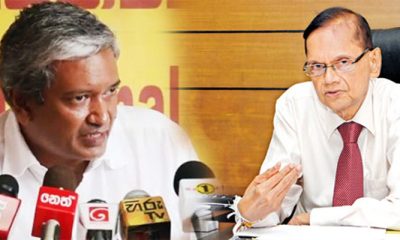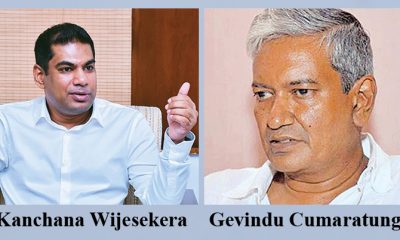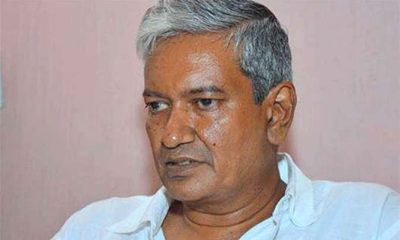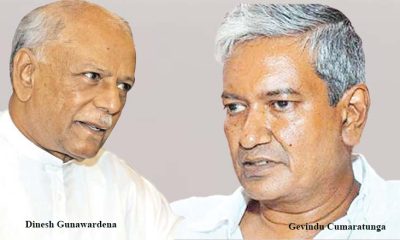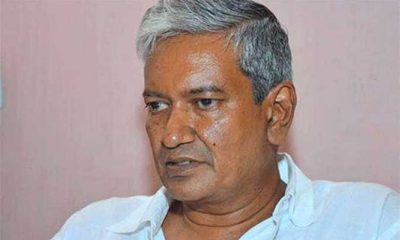News
SLPP urged to take up GR’s draft constitution with Prez
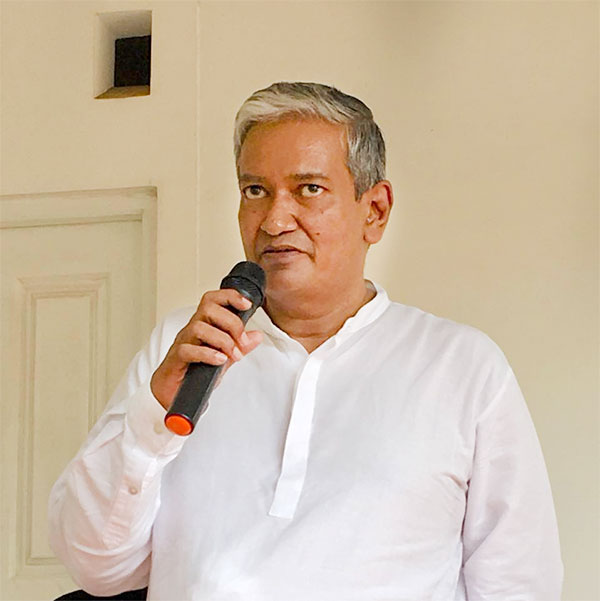
By Shamindra Ferdinando
The ruling SLPP parliamentary group should intervene to make President Ranil Wickremesinghe examine the draft Constitution formulated by the nine-member committee appointed by President Gotabaya Rajapaksa’s Cabinet-of-Ministers, rebel SLPP List MP Gevindu Cumaratunga said yesterday (15).
President’s Counsel Romesh de Silva headed the committee.
Having elected UNP leader Wickremesinghe in July last year as the President to complete the remainder of the then President Gotabaya Rajapaksa’s five-year term, the SLPP couldn’t remain silent on their own initiative, Cumaratunga said.
Responding to a query raised by The Island, the leader of civil society group Yuthukama stressed that the SLPP received two mandates at the Nov. 2019 presidential and Aug. 2020 parliamentary polls to introduce a new Constitution.
President Wickremesinghe should under no circumstances implement the 13th Amendment to the Constitution or contemplate going beyond that particular amendment, the first time entrant to Parliament said.
Questioning the President’s Office’s request for political parties to submit their recommendations, regarding the 13th Amendment, by 15th August, MP Cumaratunga said that the SLPP owed an explanation regarding its failure to take up the issue at hand with the President.
The committee announced by the then Justice Minister Ali Sabry, PC, comprised Gamini Marapana P.C., Manohara de Silva P.C., Sanjeewa Jayawardena P.C., Samantha Ratwatte P.C., Prof. Naazima Kamardeen, Prof. A. Sarveswaran, Prof. Wasantha Seneviratne and Prof. G.H. Peiris.
According to the committee, the draft that had been finalized in March 2022 was handed over to the then President Gotabaya Rajapaksa in April though it was never subject to public discussion. Both Sinhala and English copies were handed over to the President while the Legal Draftsman was requested to translate it to Tamil.
Of the political parties represented in Parliament, the main Opposition SJB and President Wickremesinghe’s party the UNP haven’t made representations to Romesh de Silva’s Committee. In spite of the Joint Legal Secretaries of the SJB meeting the Chairman of the Committee to work out modalities, the anticipated meeting didn’t take place, sources said.
The Committee received representations from delegations led by Basil Rajapaksa (SLPP), R. Sampathan (TNA), Dinesh Gunawardena (MEP), Udaya Gammanpila (PHU), Wimal Weerawansa (JNP), Tiran Alles (UPP), Vasudeva Nanayakkara (DLF), Anura Kumara Dissanayake (JJB), Raja Collure (Socialist Alliance), Dew Gunasekera (CP), Nimal Siripala de Silva (SLFP), Rushdi Habeeb (ACMC), Douglas Devananda (EPDP), Bandula Chandrasekera (JHU), Mano Ganesan (TPA), V. Radhakrishnan (UPF), Sivanesathurai Chandrakanthan (TMVP), Senthil Thondaman (CWC), Prof. Tissa Vitharana (LSSP), C.V. Wigneswaran (TMTK) and Asanka Navaratne (SLMP).
About a week before President Rajapaksa fled the country, amidst violent protests, the Committee planned to address the media regarding the new Constitution at the Presidential Secretariat. However, the media briefing was cancelled at the eleventh hour.
The committee has been divided over the 13th Amendment to the Constitution, enacted in 1988, in the wake of the Indo-Lanka Accord, signed in the year before.
The majority of Romesh de Silva’s Committee has not endorsed the Provincial Council, introduced in terms of the 13th Amendment, whereas Prof. A. Sarveswaran disagreed with the relevant Chapter (XXII) that he asserted deprived Provincial Council the powers enjoyed under the present Constitution, thereby affected reconciliation efforts.
Those who opposed asserted that the 13th Amendment undermined the unitary character thereby threatened the security of the State.
One member declared his opposition to the Provincial Council system and was not in favour of the provisions incorporated in Chapter XXII. That particular member has explained the grave danger in continuing with the existing system and the intensification of that threat in case of further devolution of power.
But two members supported the proposed Chapter XXII on the basis that
(i) No separate elections are held to constitute Provincial Councils,
(ii) Provincial Councils to consist of representatives of Local Authorities elected at the Local Authority Elections,
(iii) Provincial Councils to exercise executive power subject to the executive powers of the President and the Cabinet of Ministers
(iv) Power of the National State Assembly is not restricted in any manner with regard to any subject on which a Provincial Council has the power to make statutes.
The draft contained a full chapter on Provincial Councils. The Committee has suggested election of members to Provincial Councils and Local Authorities will be held on the same day in one election with each elector having two votes to elect a member for his electoral unit [ward] and a member for the Provincial Council from any one of the candidates in his local government area.
News
Power sector overhaul targets losses, debt and tariffs
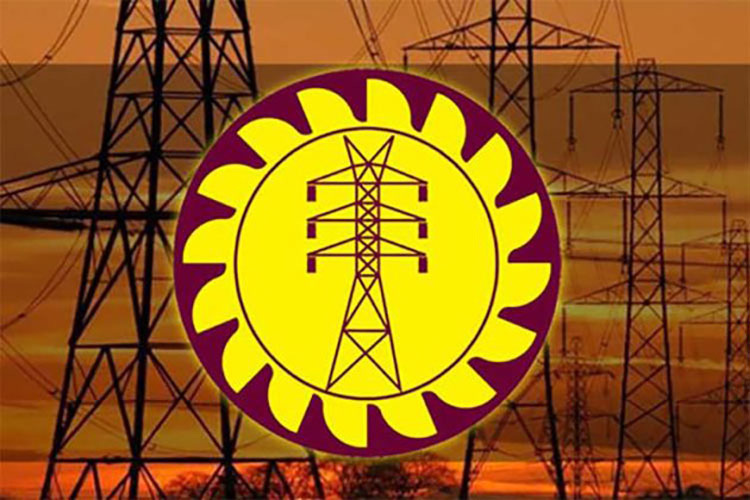
Independent trade unions cry foul
The government has launched a far-reaching overhaul of the electricity industry, breaking up the Ceylon Electricity Board (CEB) into six fully state-owned companies, claiming to rein in chronic losses and mounting debt.
Under the Preliminary Transfer Plan, the newly incorporated entities, namely, Electricity Generation Lanka (Pvt) Ltd (EGL), National Transmission Network Service Provider (Pvt) Ltd (NTNSP), National System Operator (Pvt) Ltd (NSO), Electricity Distribution Lanka (Pvt) Ltd (EDL), CEB Employees Funds (Pvt) Ltd (CEBEF) and Energy Ventures Lanka (Pvt) Ltd (EVL), will take over the assets, liabilities and operations of the CEB from the appointed date.
Independent trade unions have opposed the restructuring programme.
At the core of the new model is the creation of an independent National System Operator, which will handle power system planning and competitively procure electricity from Electricity Generation Lanka, Independent Power Producers and non-conventional renewable energy developers. Power will be wheeled through the national grid operated by the NTNSP and sold to distribution companies.
Explaining the economic rationale, Eng. Pubudu Niroshan Hedigallage said the separation of functions was critical to restoring cost discipline in the sector.
“Electricity planning and procurement will now be carried out independently, based on least-cost principles. That is essential if we are to control generation costs and ease the upward pressure on tariffs,” he said.
Electricity Generation Lanka, though a successor to the CEB, will compete with private and renewable energy producers for projects, a move expected to curb inefficiencies and end guaranteed returns enjoyed under earlier arrangements.
“There will be no automatic allocation of projects. EGL must compete in the market like any other generator,” Eng. Hedigallage said.
According to officials, the Preliminary Transfer Plan provides for one generation and one distribution company initially, with further unbundling planned under the Final Transfer Plan to introduce sharper financial accountability at operational level.
Economists note that the restructuring is closely watched by multilateral lenders and investors, who have repeatedly flagged the power sector as a major fiscal risk.
The government has insisted that the reforms do not amount to privatisation, stressing that all six entities remain 100 percent state-owned. However, independent trade unions are of the view that what the government has undertaken is divestiture in all but name.
By Ifham Nizam
News
India, Sri Lanka speakers discuss technology-driven parliamentary innovation, including AI-enabled systems
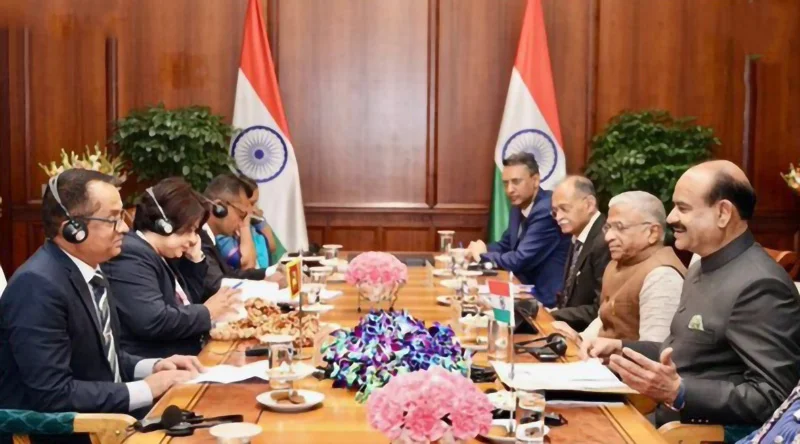
Speaker of Lok Sabha Om Birla and Sri Lankan Speaker (Dr.) Jagath Wickramaratne recently discussed the possibility of expanding parliamentary cooperation through regular exchanges, formation of friendship groups, collaboration in policy and programme design and deeper engagement in technology-driven parliamentary innovation, including AI-enabled systems, real-time multilingual translation, and capacity building through Parliamentary Research and Training Institute for Democracies (PRIDE).
The discussion took place on the sidelines of the 28th Conference of Speakers and Presiding Officers of the Commonwealth (CSPOC) held in New Delhi recently.
The following is the text of the statement issued by the Indian High Commission in Colombo: ” Speaker of the Parliament of Sri Lanka (Dr.) Jagath Wickramaratne concluded his visit to India from 14-18 January 2026, for participation in the 28th Conference of Speakers and Presiding Officers of the Commonwealth (CSPOC) held in New Delhi. This was his first visit to India after assuming office. He was accompanied by Secretary-General of Parliament Kushani Rohanadeera and Assistant Director, (Administration) of the Parliament of Sri Lanka Kanchana Ruchitha Herath. Following the 28th CSPOC from 14-16 January 2026, Speaker and his delegation visited Jaipur, Rajasthan as a part of a two-day tour for CSPOC delegates from 17-18 January 2026.
The 28th CSPOC was inaugurated by Prime Minister of India Narendra Modi on 15 January 2026 at the Central Hall of Samvidhan Sadan, Parliament House Complex, New Delhi. Welcoming parliamentary leaders from across the Commonwealth, Prime Minister Modi highlighted the success of Indian democracy in providing stability, speed, and scale. He shared India’s efforts at giving voice to the Global South and forging new paths of cooperation to co-develop innovation ecosystems. He underlined the use of Artificial Intelligence by the Parliament of India to attract youth to understand Parliament. Prime Minister expressed his confidence in the CSPOC platform for exploring ways to promote knowledge and understanding of parliamentary democracy.
The conference, chaired by Lok Sabha Speaker Om Birla, convened 44 Speakers and 15 Deputy Speakers from 41 Commonwealth countries, along with representatives of four semi-autonomous Parliaments. The theme of the conference was “Effective Delivery of Parliamentary Democracy.” During the conference, participants addressed the role of Speakers in reinforcing democratic institutions, the integration of artificial intelligence in Parliamentary functions, the influence of social media on Members, approaches to enhance public engagement with Parliament, and measures to ensure the security, health, and wellbeing of Members and Parliamentary staff.
The visit marked a significant milestone in the evolving parliamentary partnership between India and Sri Lanka. Last year, two Parliamentary Delegations visited India for Orientation Programmes in May 2025 and August 2025 respectively. These visits, in line with the intent of the India – Sri Lanka Joint Statement on ‘Fostering Partnerships for a Shared Future’, further reinforce the strong democratic ethos and enduring friendship shared between the two nations.”
News
Pakistan HC celebrates academic achievements of Lankan graduates
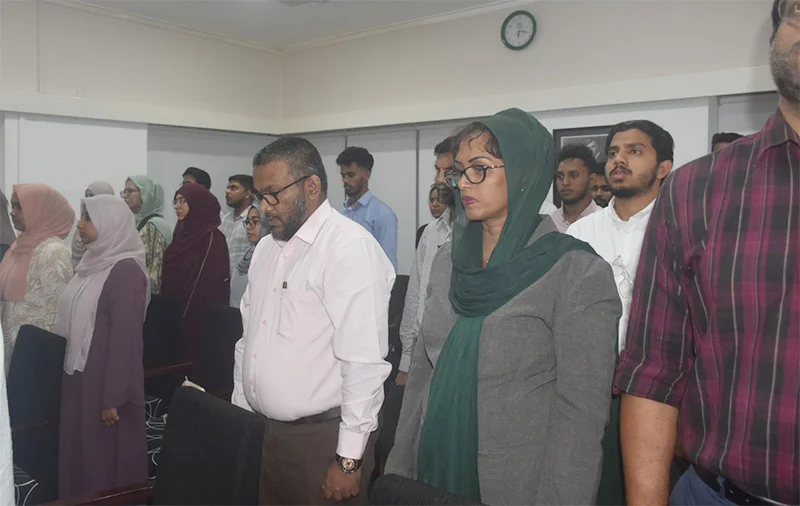
The High Commissioner of Pakistan in Sri Lanka hosted a special reception on Friday (16) for Sri Lankan alumni who have recently returned from their studies in Pakistan. The event, held at the Pakistan High Commission, celebrated the academic achievements of the graduates and reinforced the deep-rooted educational ties between the two nations.
The Allama Iqbal Scholarship Programme, a flagship initiative launched in 2019, has become a vital pillar of bilateral cooperation. The High Commissioner highlighted that Pakistan offers 1,000 fully funded scholarships at graduate, postgraduate, and PhD levels, with over 500 Sri Lankan students currently pursuing their education in Pakistan’s premier universities.
“Sri Lanka and Pakistan share an enduring friendship rooted in a shared history of mutual respect and culture,” the High Commissioner remarked during the address. “Education is the key to unlocking the success of your brilliant futures and creating bonds that extend well beyond the classroom”.
Addressing the alumni as “custodians” of a noble cause, the High Commissioner urged the alumni to act as brand ambassadors by sharing their knowledge to guide deserving students toward academic opportunities in Pakistan.
He emphasised their responsibility to mentor young minds, ensuring no capable student misses the chance for a promising future. Furthermore, the alumni were encouraged to take an active role in organising frequent educational and cultural engagements to inspire and enlighten others while strengthening the ties between the two nations.
The High Commissioner emphasized that each graduate serves as a “bridge” between the two countries, playing a meaningful role in uplifting Sri Lanka while further strengthening Pakistan–Sri Lanka relations. The alumni were invited to remain closely connected with the High Commission to facilitate future initiatives that strengthen people-to-people ties.
The evening concluded with a traditional Pakistani dinner, where the alumni shared stories of their academic growth and cultural experiences in Pakistan in a spirit of friendship and togetherness.
-

 Editorial2 days ago
Editorial2 days agoIllusory rule of law
-

 News3 days ago
News3 days agoUNDP’s assessment confirms widespread economic fallout from Cyclone Ditwah
-

 Business5 days ago
Business5 days agoKoaloo.Fi and Stredge forge strategic partnership to offer businesses sustainable supply chain solutions
-

 Editorial3 days ago
Editorial3 days agoCrime and cops
-

 Features2 days ago
Features2 days agoDaydreams on a winter’s day
-

 Editorial4 days ago
Editorial4 days agoThe Chakka Clash
-

 Features2 days ago
Features2 days agoSurprise move of both the Minister and myself from Agriculture to Education
-

 Features1 day ago
Features1 day agoExtended mind thesis:A Buddhist perspective


